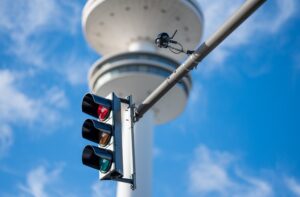
Minnesota lawmakers are hoping to greenlight a pilot project that would bring traffic enforcement cameras to Minneapolis and other metro-area communities.
If lawmakers get their way, the four-year pilot program would authorize red light and speed cameras in areas near schools and areas deemed high-risk zones based on previous crash data. The cameras would be installed in Minneapolis, Mendota Heights and one county and city in the metro chosen by the Minnesota Department of Transportation.
Lawmakers and city officials said the data collected by the cameras would help gather local intel on how to make certain roads and areas safer. However, drivers could also be cited if they are caught violating different traffic laws. Both red light and speed camera violations would carry a $40 fine, but speeding violations would jump to $80 if the driver is going 20 miles or more over the posted speed limit.
“This is, I think, a step in the right direction. I don’t think it will completely fix the issue itself, but I think it will help change behavior and the way people drive in our city,” said Sen. Zaynab Mohamed, DFL-Minneapolis, who sponsored the bill.
Updated Bill Language
Sen. Mohamed first brought the bill forward last year but decided to work towards an amended version after hearing feedback from lawmakers and stakeholders. It will be interesting to see if the bill gains traction among lawmakers, because this isn’t the first time traffic cameras have been proposed in Minnesota. Back in 2007, the Minnesota Supreme Court ruled against the use of traffic cameras in Minneapolis, upholding a lower court ruling that said the proposed plan violated state law. Back in 2007, the ACLU of Minnesota also had due process concerns about the accuracy of traffic camera tickets, as the tickets would have been issued to the owner of the vehicle, regardless of who was driving it at the time.
Although he didn’t get into specifics, Ethan Fawley, coordinator of the Minneapolis Vision Zero program, said many old concerns have been addressed in the proposed pilot program.
“We know that there are questions around fairness, privacy, equity, and we’ve taken all those best practices from around the country,” Fawley said. “And the feedback that we’ve heard locally, and incorporated that into the bill.”
We have some serious concerns about how these traffic cameras will be able to effectively catch and ticket the right drivers when they detect an illegal act, but having been in the legal field for some time, we expect this type of proposal to face heavy scrutiny and opposition from a number of lawmakers. It certainly seems like any type of traffic enforcement camera system would face an uphill battle to become law, even if it is rooted in the idea of making dangerous roads and school zones safer. We’ll keep tabs on the proposal during the next legislative session.
In the meantime, if you need help with a traffic matter of your own, reach out to Avery and the team at Appelman Law Firm today at (952) 224-2277.





